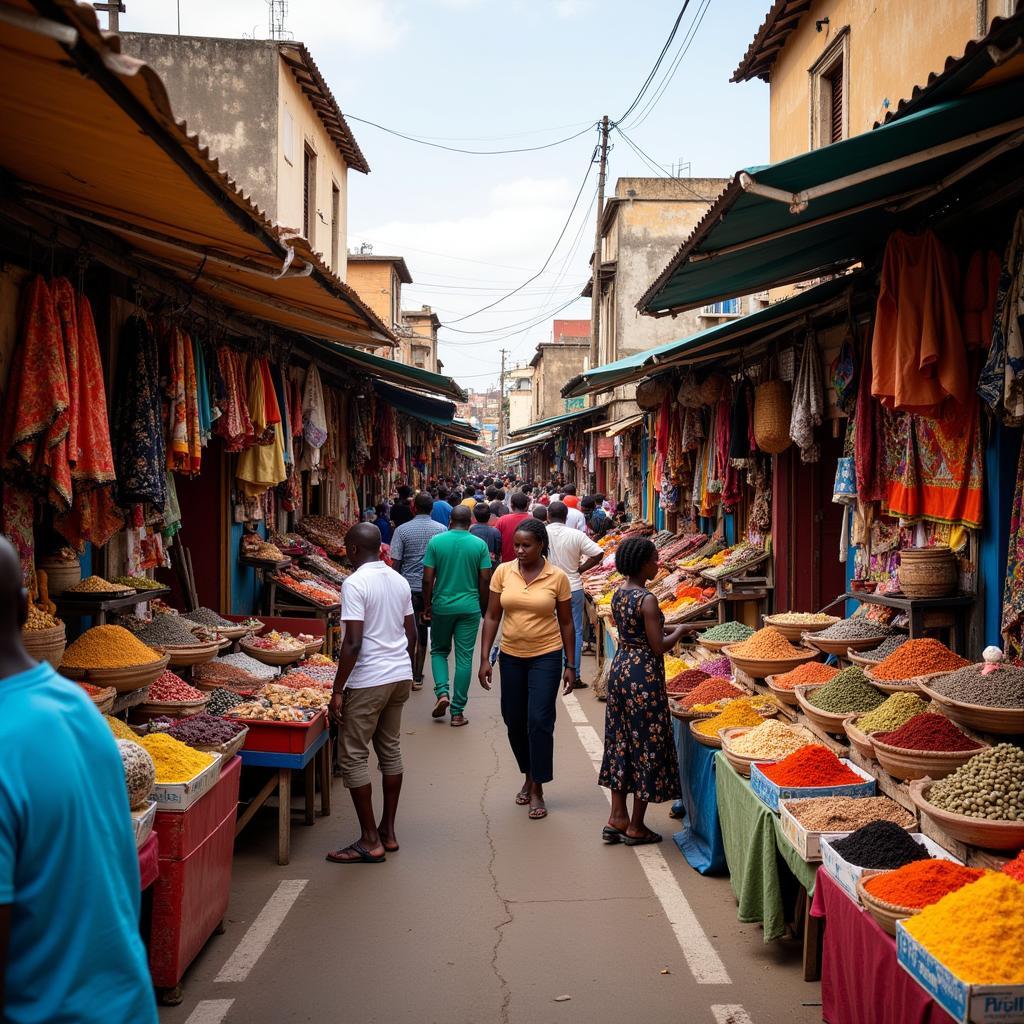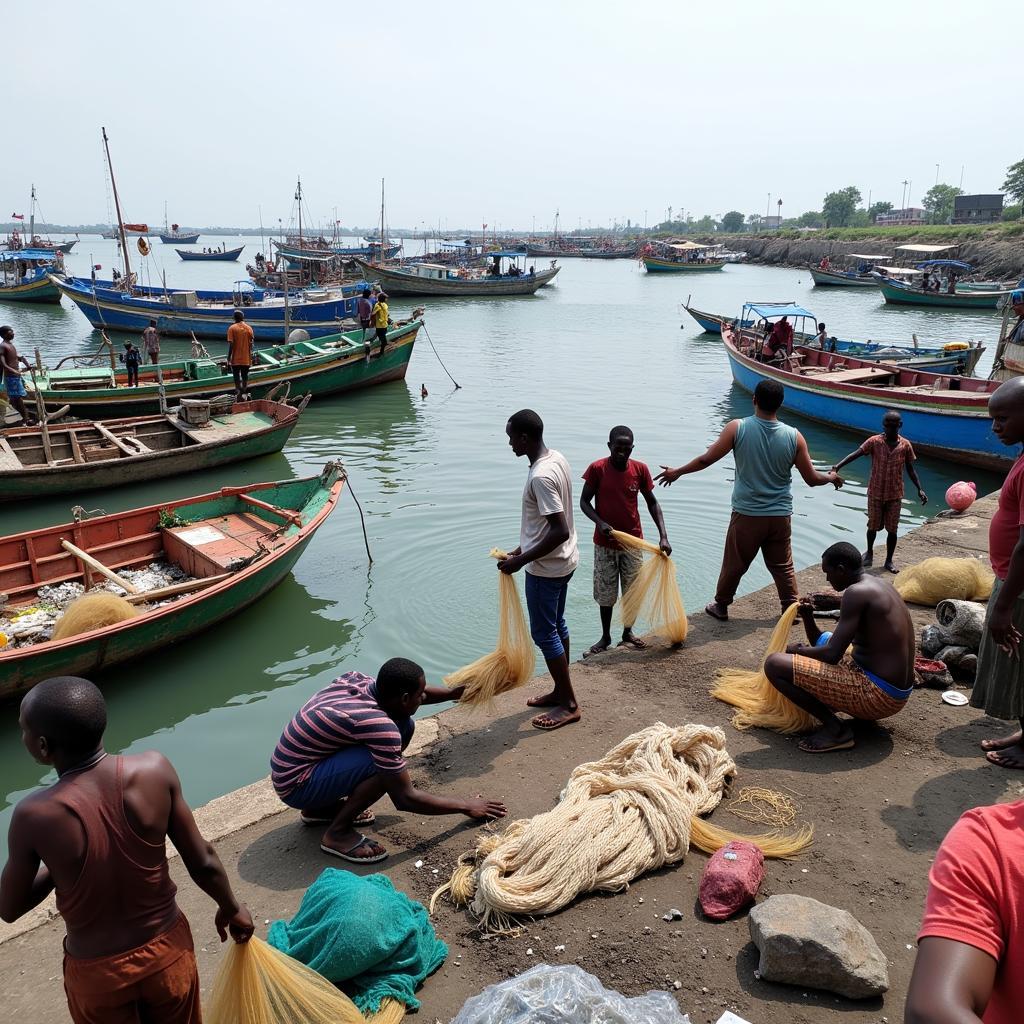Exploring Africa’s Vibrant Coastal Cities
Africa’s coastal cities offer a captivating blend of rich history, vibrant culture, and breathtaking scenery. From bustling metropolises to tranquil fishing villages, these urban centers pulse with life, reflecting the diverse influences that have shaped the continent. This exploration delves into the unique charm and allure of African Coastal Cities, showcasing their historical significance, cultural richness, and the opportunities they present. african countries and capitals in alphabetical order
A Tapestry of History and Culture in African Coastal Cities
Many African coastal cities boast a rich tapestry of historical influences. Serving as vital ports for centuries, they have witnessed the ebb and flow of trade, migration, and cultural exchange. These interactions have left an indelible mark on the architectural landscape, culinary traditions, and the very fabric of daily life. Cities like Mombasa, Zanzibar, and Cape Town stand as testaments to this vibrant past, with their historic forts, colonial-era buildings, and multicultural populations.
The coastal regions of Africa are renowned for their vibrant artistic traditions. From intricate wood carvings and colorful textiles to rhythmic music and captivating dance performances, these art forms reflect the diverse cultural heritage of the communities that call these cities home. Music, in particular, plays a central role in coastal life, with genres like highlife, kwaito, and taarab filling the air with infectious rhythms.
 Bustling marketplace in an African coastal city
Bustling marketplace in an African coastal city
The Economic Pulse of African Coastal Cities
African coastal cities are major economic hubs, playing a crucial role in their respective countries’ development. Fishing, tourism, and maritime trade are key industries, providing employment and contributing significantly to the local economies. These cities also serve as gateways for international trade, connecting Africa to the global market. The growth of these sectors has led to rapid urbanization, attracting people from across the continent in search of opportunities.
Many coastal cities have invested heavily in infrastructure development to support their growing economies. Modern port facilities, improved transportation networks, and the expansion of tourism infrastructure have helped to boost trade and attract foreign investment. These developments are transforming the urban landscape and creating new opportunities for economic growth.
african country with largest area
What are the key challenges facing African coastal cities?
Rapid urbanization and population growth have put a strain on resources and infrastructure in many African coastal cities. Issues such as inadequate housing, limited access to clean water and sanitation, and traffic congestion pose significant challenges. Climate change also presents a growing threat, with rising sea levels and extreme weather events posing risks to coastal communities and infrastructure.
How are African coastal cities addressing these challenges?
Many cities are implementing sustainable urban development strategies to address these challenges. These include investing in renewable energy, promoting green building practices, and improving public transportation systems. Efforts are also being made to strengthen coastal resilience and adapt to the impacts of climate change.
Exploring Tourism in African Coastal Cities
Tourism plays a vital role in the economies of many African coastal cities. The stunning beaches, diverse wildlife, and vibrant cultural attractions draw visitors from around the globe. From exploring ancient ruins and bustling markets to diving in crystal-clear waters and encountering incredible wildlife, these cities offer a wealth of experiences. 10 african countries and their capital
“African coastal cities are microcosms of the continent’s diverse cultures and traditions,” notes Dr. Amina Omar, a renowned anthropologist specializing in African urban studies. “They are dynamic spaces where tradition meets modernity, creating a unique and captivating atmosphere.”
african countries and capitals alphabetical order
The Future of African Coastal Cities
African coastal cities stand at a crossroads, poised for significant growth and transformation. As these urban centers continue to evolve, it is crucial to balance economic development with environmental sustainability and social equity. Investing in education, healthcare, and infrastructure will be key to ensuring that the benefits of growth are shared by all.
“The future of Africa’s coastal cities hinges on embracing sustainable development practices,” adds Dr. Omar. “By prioritizing environmental protection and social inclusion, these cities can unlock their full potential and become beacons of prosperity for the entire continent.”
 Busy fishing port in an African coastal city
Busy fishing port in an African coastal city
In conclusion, African coastal cities offer a unique blend of history, culture, and opportunity. From their vibrant cultural scenes and bustling economies to the challenges they face and the innovative solutions they are developing, these cities are dynamic and ever-evolving. By embracing sustainable development and investing in their people, African coastal cities can unlock their full potential and become thriving centers of innovation and prosperity. african express nairobi city
FAQ
- What are some of the most popular African coastal cities for tourists?
- What are the main economic activities in African coastal cities?
- What are the challenges faced by African coastal cities due to climate change?
- What are some examples of sustainable urban development initiatives in African coastal cities?
- How is tourism contributing to the development of African coastal cities?
- What is the cultural significance of music and dance in African coastal communities?
- What are some examples of historical landmarks found in African coastal cities?
When you need help, please contact Phone Number: +255768904061, Email: kaka.mag@gmail.com Or visit: Mbarali DC Mawindi, Kangaga, Tanzania. We have a 24/7 customer support team.



